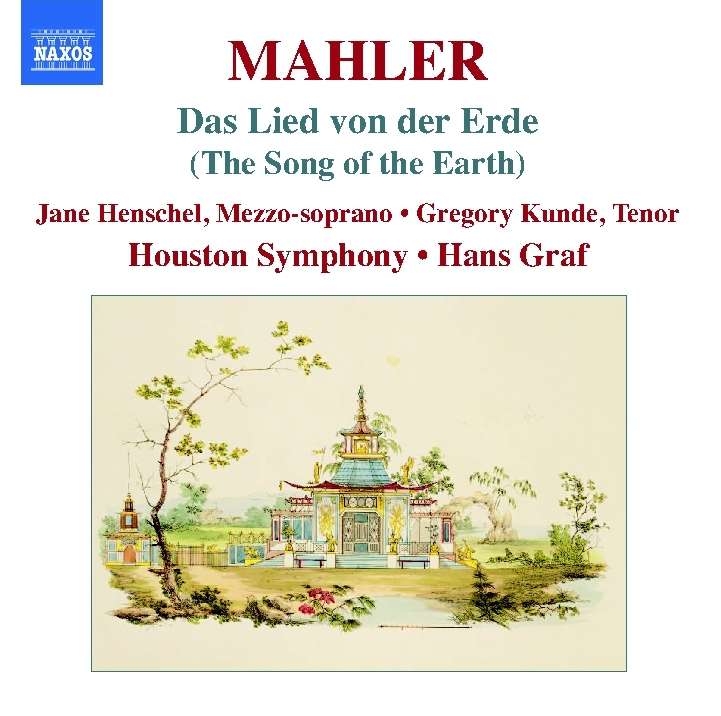|
Back
01/13/2012
Gustav Mahler: Das Lied von der Erde
Jane Henschel (Mezzo-Soprano), Gregory Kunde (Tenor), Houston Symphony Orchestra, Hans Graf (Conductor)
Recorded at Jesse H. Jones Hall for the Performing Arts, Houston, Texas (19-22 November, 2009) – 63’
Naxos # 8.572498 – Booklet with essays in English (Translations available from Naxos online)

   
Mahler’s expansive “symphony for two vocal soloists and orchestra” has come to find an elevated place in the repertoire. Of all Mahler’s symphonic compositions, there’s something disarmingly intimate about this piece from 1909, which was not premiered until after the composer’s death in 1911. While virtually all performances and recordings of Mahler’s works are events in themselves, Das Lied von der Erde may be alone in triggering an awe-struck response of almost indefinable reverence. Its very basic themes of nature and instinct, with its concluding message of farewell, make it perhaps the most primitively affecting of all Mahler’s music. Fortunately, while this new recording from the Houston Symphony is by no means definitive, it is lovingly performed and highly moving.
Conductor Hans Graf has done an admirable job here of delivering a lyric performance of this piece. There is sincere sweep and an infectious lightness in his tempi that never sounds rushed. Brass attacks, particularly in the opening phrases of the “Das Trinklied,” are sharp and scornful, but balanced by the swaying strings. While the harshness and hellacious outbursts of the first movement and “Der Trunkene im Fruhling” are not evaded, Graf paces the energy brilliantly, as in leading up to “Seht dort hinab!” in the former movement. Graf’s vision of this drunkard is one of more lucidity than other conductors may chose. The orchestra tends to respond with rhythmically nimble playing, purposefully sacrificing weight of tone for coherence and length of phrase. In “Der Einsame im Herbst,” the strings are light on the bow and paint a vivid atmosphere of placidity. This technique extends to the majority of the piece, particularly the ensuing “Von der Jugend,” performed with appropriate Mahlerian Naturton.
Tenor Gregory Kunde’s biography in the enclosed booklet describes him as “one of the most elegant and accomplished bel canto singers on the opera stage today.” Such a description is a bit of a surprise, given his stentorian performance on this disc. There is no shortage of wide, heroic sound with brilliant squillo. The tenor’s best moment on this disc is easily in the first movement. His declamation of “Hinausgellt in den süssen Duft des Lebens!” is shattering and impressive. Unfortunately, either through fatigue or technique, his voice is not as reliable in “Von der Jugend.” His mixed voice is reliably present, but not as easily delivered or assured. In the peaks of his range, his sound will occasionally lose focus, and suffer from a slightly spread vibrato. Still, in a piece with such legendary demands, it is an impressive delivery that should be a welcome part of any world-class orchestra’s performance.
Jane Henschel’s performance is effective, but not as vocally secure as one would like in this role. Her chest voice is lacking in weight and her pianissimos at the opening of “The Farewell” are insecure, with a bit of a flutter. Despite these misgivings, her singing is gratifying. Her German is excellent (clearer than Kunde’s) with true dramatic investment. She impressively keeps up with Graf’s breakneck tempo (the fastest I’ve heard) in the middle of “Of Beauty,” spitting out the conglomeration of consonants and vowels with fine enthusiasm. Yet Henschel’s greatest strength is her ability to spin long, lyrically lush lines. This makes her “Du liebe Erde allüberall” worth the price of admission and a beautiful conclusion to the disc.
The sound quality is satisfactory, but not very dynamic in its range. While the sound stage is somewhat narrow, its depth is apparent. Occasionally, soloists wander and lose focus from a clear center, probably the result of this recording coming from live performances. While the performances and sound quality of this recording are not the finest available, this disc is still wonderfully coherent in its presentation of Graf’s interpretation of this monumental piece, and given its budget price, is worth a listen to those who, like me, cannot live without this music.
Matthew Richard Martinez
|